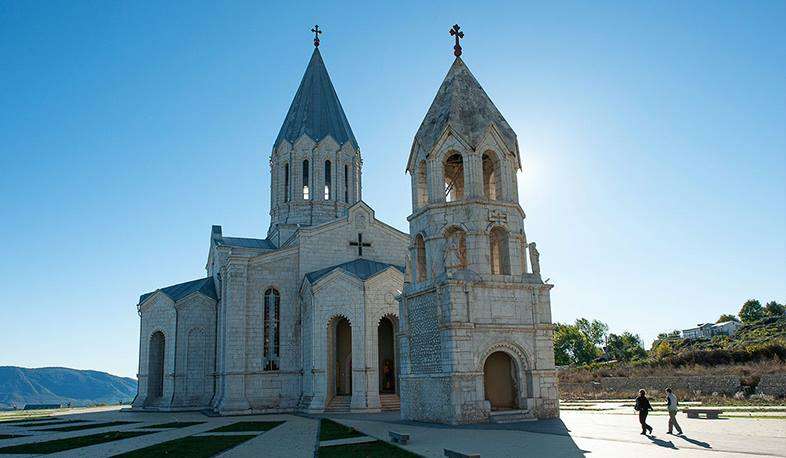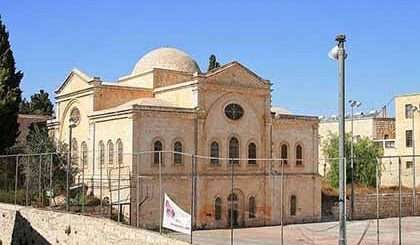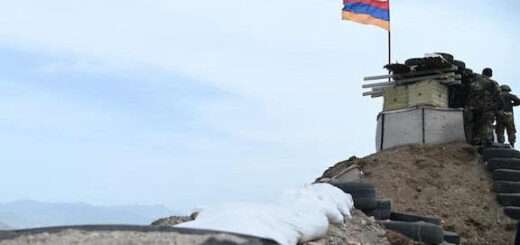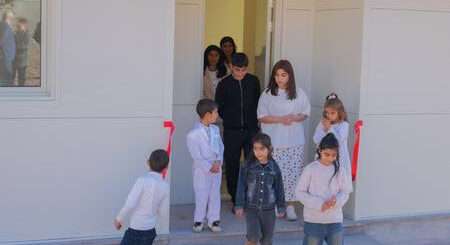Armenia’s Ancient Christian Faith Under Attack

Pope Leo XIV’s meeting with the head of the Armenian Church, Catholicos Karekin II, was a significant sign for the millions in the country who are pleading for help and protection against an authoritarian Prime Minister Nikol Pashinyan who has targeted the church and made his bed with its enemies. Pashinyan has launched an unprecedented attack on the Armenian church, the country’s oldest institution which started in 301 A.D.
In recent weeks, Pashinyan—a convicted felon brought to power with Russian help in 2018 and has presided over a series of territorial losses — has launched a massive assault against the Armenian church, which has roots going back to 301 A.D.
On May 30, 2025, Pashinyan posted a series of abusive and vulgar Facebook statements against the leader of the Armenian church, Catholicos Karekin II, calling for his removal. “Your Eminence, keep sc***wing your uncle’s wife and leave me alone,” he said addressing an unnamed high-ranking clergyman. The online sniping continued for a few days, while at some point Pashinyan offered to have his genitalia examined for proof that he has not been circumcised, a procedure not common among Christians. While keeping quiet until recently, Catholicos now appears to be willing to push back against Pashinyan’s attacks and his policies. He visited Pope Leo XIV in Vatican on September 16 and reached out to other religious leaders to keep them informed about the conflict.
Although the public outcry against PM’s repugnant behavior was widespread and strong, Pashinyan did not hesitate to go after the dissenters. His first victim was billionaire Samvel Karapetyan, known for his sizable philanthropic activities in Armenia. He was apprehended on June 18 and jailed for two months on charges of trying to overturn the government, for making a public statement in support of the church. Within days, the Pashinyan-controlled parliament moved to start the process of nationalizing the Armenia’s electricity distribution network owned by Karapetyan.
On June 25, 2025, Pashinyan had Archbishop Bagrat Galstanyan, the Primate of the Tavush Diocese, arrested over an alleged coup plot alongside 13 other individuals. Although Galstanyan has been an outspoken critic of Pashinyan’s land concessions to Azerbaijan and has led a sizable protest movement calling for Pashinyan’s resignation in 2024, his arrest is seen by many in Armenia as an attack against the church and its followers who oppose Pashinyan’s policies.
However, the confrontation did not stop there. Masked police and officers from Armenia’s National Security Service arrived at the Mother See of Holy Etchmiadzin — the headquarters of the Armenian Apostolic church — on June 27 to detain Archbishop Mikayel Ajapahyan, the Primate of the Shirak Diocese. Pashinyan-controlled judiciary accused him of making public statements more than a year ago that they say constituted a call to seize power and forcibly overthrow Armenia’s constitutional order.
The list of Pashinyan’s high-profile victims and political prisoners also includes Varuzhan Avetisyan, the leader of (the conservative, pro-Western opposition party) National Democratic Alliance (NDA) and one of Pashinyan’s main political opponents, who remains in jail since May 2023 on similar charges. NDA has lobbied Washington for closer ties with Armenia and built relations with influential Republican members of the U.S. House of Representatives.
The Fallout and the Coverup
Although Karapetyan, Galstanyan, Ajapahyan, Avetisyan, and several others remain in jail, it is Pashinyan who is trapped. His latest approval rating is at 8 percent and — despite his tight grip on law enforcement agencies, and short of deploying massive election manipulations — he has no chance of maintaining his grip on power after elections scheduled for June 2026.
Some outside of Armenia are beginning to take notice. A statement co-signed by a group of U.S.-based religious freedom organizations on July 2 specifically stated: “We categorically denounce Prime Minister Nikol Pashinyan’s relentless, politically motivated assaults on the sacred Armenian Apostolic Church, its devoted clergy, and, by extension, the faithful Armenian people whose spiritual, moral, and national identity are deeply rooted in their Church.” In a recent statement, the Armenian Revolutionary Federation, the largest grassroots Armenian Diaspora organization in the US, noted that this “marks a dangerous new chapter in Armenia’s descent into authoritarian rule.”
This is not an isolated incident by any measure and is a continuation of Biden’s policies vis-a-vis Armenia. A recent report highlighted evidence that the Biden’s State Department has ignored information about Pashinyan’s ties to Russia and its implications for Armenia. Alarmingly, back then the criticism of Pashinyan was suppressed in favor of a narrative promoted by Russia and Turkey, both of which support the Pashinyan regime.
Despite his “pro-Western” rhetoric, Pashinyan remains a puppet of Russia, opposed to any meaningful rapprochement with the U.S. His recent rant delivered in the parliament, mocking the U.S. for being a fickle ally, on which “the Armenian people should not rely,” is a testament to that. His policies have been disastrous for Armenia and are viewed as defeatist by most people in Armenia and the Armenian American community, many of whom voted for the Trump-Vance ticket in November 2024.
Pashinyan signed a strategic partnership agreement with China on August 31, only days after the historic August 8 signing of the Agreements in the White House arranged by the Trump Administration.
Pashinyan’s abandonment of fellow Christian Armenians in Nagorno-Karabakh in 2020–23 was part of the discussion between the Catholicos and Pope Leo, according to news reports.
This would be a good time for the Pope, the Catholic Church, the U.S. and others to extend a helping hand to Armenia, most of whom remain faithful followers of Christian values and the Armenian church. A strong statement denouncing Pashinyan’s actions against the church would go a long way in helping the people of Armenia to remove their discredited prime minister from power and force new elections. This will allow the citizens of Armenia to elect a government that is willing and able to defend the country from its belligerent neighbors and build stronger relations with others and fend off Muslims who currently dominate that important region.
Dr. David A. Grigorian is a Research Fellow at Harvard University’s Kennedy School of Government and a Non-Resident Fellow at the Center for Global Development in Washington, DC.






